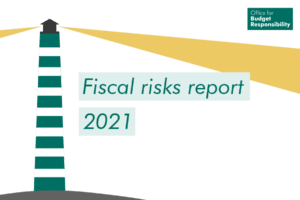Every two years the Office for Budget Responsibility produces a report on the fiscal risks facing the UK. Our next Fiscal risks report (FRR) is due to be released this summer.
This FRR is being prepared in the wake of the largest fiscal risk to have crystallised in peacetime – the coronavirus pandemic – the economic and fiscal consequences of which continue to be felt. It will therefore focus on what we can learn from this experience to enhance our understanding and inform the Government’s management) of other potentially catastrophic or ‘tail risks’ facing the UK and countries around the world.
So, in addition to providing updates on significant developments regarding the specific risks highlighted in previous reports, the 2021 FRR will examine three sources of risk in greater detail:
- The first will be the pandemic itself, where we will explore: what can be learnt from UK and international experience of this unprecedented economic and fiscal shock; the economic and fiscal support extended by governments during the crisis and the legacy risks that these might pose for the public finances over the medium term; and the potential longer-term implications of the pandemic for the economy and public finances.
- The second will be climate change, where we will consider the potential economic and fiscal consequences of: unmitigated climate change relative to a world in which the Paris targets for limiting global warming are met; approaches to decarbonising the UK economy; and different scenarios for meeting the Government’s target for net zero emissions from the UK economy by 2050.
- The third will be public debt, where we will look at the historic drivers of debt levels and interest rates; consider potential scenarios for the future path of interest rates; and implications for long-run fiscal sustainability .
While these risks come from different sources and have their own unique drivers, they also share some commonalities. There is a significant degree of uncertainty concerning both the timings and scale of their associated costs; they are characterised by non-linearities or ‘snowball effects’ in which costs can escalate dramatically from the point of crystallisation, with potentially catastrophic consequences for economies and public finances; and they are also global in nature with high potential for rapid contagion of risk across countries. Governments seeking to manage these threats must therefore weigh the known costs of early action to mitigate these risks against the uncertain costs of dealing with them when they crystallise; and they need to weigh the limited but more deliverable benefits of acting unilaterally against the much greater but more elusive gains from acting globally.
Compiling this report will take the OBR into some areas beyond our core expertise. We would therefore like to invite those with expertise or experience in these areas to share with us their insights or direct us to relevant material that we should consider for the report. You can contact us by emailing [email protected].

